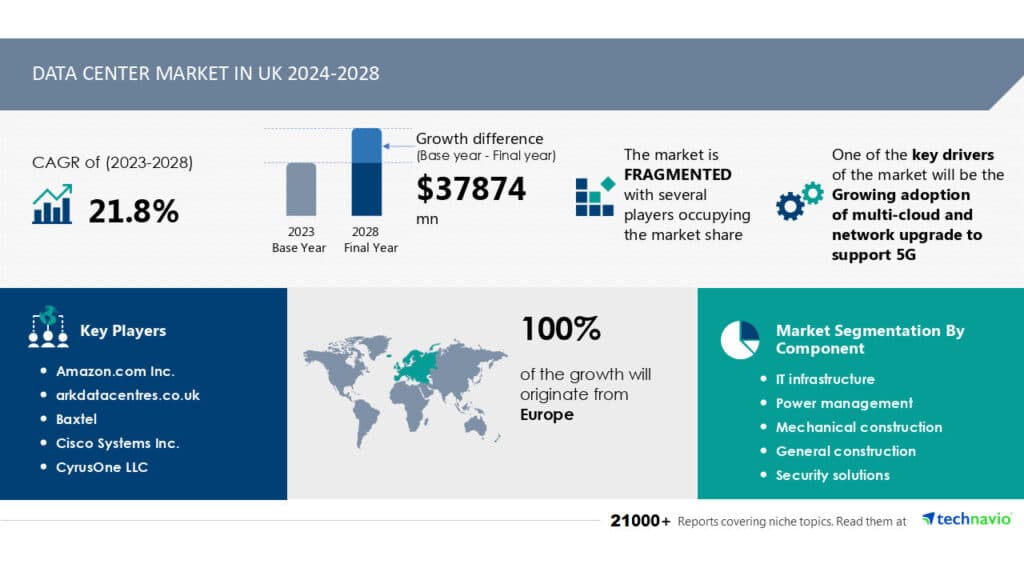The data center sector in the United Kingdom is experiencing unprecedented growth, driven by the adoption of multi-cloud strategies, the need for more robust digital infrastructures, and the consolidation of traditional data centers. According to a report by Technavio, the market is expected to reach a value of 37.87 billion dollars between 2024 and 2028, with a compound annual growth rate (CAGR) of 21.8%.
This growth is a response to the increasing demand for cloud services, data storage, artificial intelligence, and automation, fueled by the rise of digital commerce, 5G connectivity, and data sovereignty regulations in Europe.

Key Factors in the Growth of the Data Center Market in the UK
The British digital ecosystem is evolving rapidly, leading to an increase in investment in hyperscale data centers, hybrid solutions, and energy-efficient technologies.
1. Expansion of Multi-Cloud and Digital Transformation
Companies are adopting hybrid and multi-cloud infrastructures to optimize their operations. Large corporations and startups are migrating their workloads to the cloud to benefit from scalability, flexibility, and cost reduction.
Example: Amazon Web Services (AWS), Microsoft Azure, and Google Cloud have intensified their investments in the UK to provide more options for companies seeking secure and scalable infrastructure.
2. Impact of 5G and Edge Computing
The rollout of 5G technology is increasing the demand for edge data centers, which allow data to be processed closer to the end user, reducing latency and enhancing the performance of real-time applications.
Example: Equinix and Digital Realty have announced new facilities in London and Manchester to support the expansion of 5G networks.
3. Consolidation and Energy Efficiency
Companies are opting to consolidate their data centers to improve energy efficiency and reduce operational costs. This approach allows for savings of up to 30% in operational costs and a reduction in energy consumption of up to 55%.
Example: National Grid has selected Wipro to consolidate its data centers and migrate to a hybrid cloud architecture.
Sector Challenges
Despite the opportunities, the sector faces significant challenges:
1. High Energy Consumption and Sustainability
Data centers are responsible for substantial energy consumption, posing a challenge in terms of sustainability. Companies are looking for ways to reduce their carbon footprint through renewable energies and more efficient cooling systems.
Example: Microsoft and Iron Mountain are developing data centers powered by solar and wind energy to mitigate environmental impact.
2. Security and Regulatory Compliance
With the growth of data storage, security and regulatory compliance have become critical. European regulations, including the General Data Protection Regulation (GDPR), require companies to manage information securely and transparently.
Example: IBM and SAP are enhancing their data centers in the UK with advanced security certifications to comply with local and European regulations.
3. Infrastructure and Operational Costs
The increase in demand requires robust infrastructure, resulting in rising investment and maintenance costs. Companies are seeking colocation and managed services to optimize costs.
Example: Verizon and Oracle are investing in modular and prefabricated data centers, allowing for rapid installation and lower costs.
Market Segmentation
The data center market in the UK is divided into several segments based on infrastructure type and the industries it serves:
| Segment | Details |
|---|---|
| Components | IT infrastructure, energy management, mechanical construction, security, connectivity solutions |
| Location | United Kingdom and Europe |
| Key Industries | IT & Telecom, Finance, Healthcare, Manufacturing, Retail |
| Technological Trends | Hyperscale, multi-cloud, edge computing, AI, automation, energy efficiency |
Emerging Trends in UK Data Centers
- Increased Investment in Hyperscale and Colocation
- Companies like Equinix and Digital Realty are leading growth with investments in scalable infrastructure.
- Integration of AI and Automation
- Data centers are implementing machine learning and optimization algorithms to enhance performance and reduce operational costs.
- Adoption of Renewable Energies
- Amazon, Google, and Microsoft are leading the transition to zero-carbon footprint data centers.
- Expansion of Edge Computing
- The emergence of 5G is driving the construction of micro data centers in urban and suburban areas.
Conclusion: A Market in Full Transformation
The data center market in the United Kingdom is growing rapidly, driven by the adoption of cloud solutions, 5G, and the need for more efficient and secure infrastructures.
Despite challenges related to energy consumption and security, the industry is adapting with strategies such as consolidation, automation, and the use of renewable energies.
In the coming years, investment is expected to continue to rise, focusing on smart, sustainable, and scalable data centers aligned with global technological evolution.

